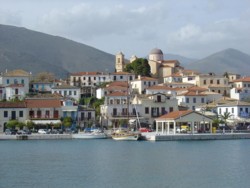 |
|
|
|
|
People from all over the world, who were not born in Greece, but are of Greek origin, are interested in learning what is required to apply for and obtain the Greek citizenship. They were born outside of Greece, to parents, or grandparents, or sometimes even great grandparents, who were born in Greece. Or simply, to ancestors who were never born in Greece, but they were undoubtedly Greek, like the Greeks of the Ottoman Empire (Turkey), of the Middle East (Egypt, Lebanon, Syria etc.), of Russia and of the other former soviet republics etc. |
|
Those who can prove that have ancestors born in Greece can apply for certification of their Greek citizenship, while those whose ancestors, although undoubtedly Greek, were never born in Greece, are entitled to apply for naturalization. Both types of application lead to the same goal, the full fledged Greek, (and also European), citizenship. Anyone who wishes to learn whether he/she is eligible for the Greek citizenship and if yes, how to apply for it, must have part or all of the the following information. The starting point is the full name and data of the ancestor(s) of the applicant, who were born in Greece. This includes the ancestor's name, last name (surname), his or her father's first name, the place of the ancestor's birth in Greece, as close as possible and the year of birth in Greece, as accurate as possible. |
 Photo courtesy of Iliopoulos |
Once the above information is available, a search can be undertaken to determine whether any birth or other record of the Greek-born ancestor can be located at the official archives or municipal records of any Greek town or village. If the result is positive, the possibility for the particular applicant to obtain the citizenship increases dramatically. Next, we need the marriage certificate of the ancestor. It does not matter if the marriage took place in Greece, which is preferable, or outside of Greece. If both ancestors (parents or grandparnets) were born in Greece, things are easier. In the case where only one of the grandparents was Greek-born, the gender is of importance. If the Greek-born ancestor is/was a grandfather, his marriage to a non-Greek grandmother must be proven religious, Greek Orthodox, if he was Greek Orhtodox, or religious Jewish, if he was Jewish etc. If on the other hand, the Greek-born ancestor is/was a grandmother, married to a non-Greek grandfather, her marriage must today be proven just civil, not religious. The type of marriage (civil or religious of any dogma) of the parents of the applicant is not relevant and cannot be an obstacle to the citizenship application, as long as we have a certified copy of it (with the certificate of the Apostille, from certain countries like the USA, Australia, South Africa, but not from Canada). The birth certificate of the Greek parent of the applicant is also required, as well as the birth certificate of the applicant himslef/herself, also with Apostille, if from certain countries. If the grandparent or parent of the applicant was divorced prior to the marriage from which the applicant was born, we may also need the divorce court decision and the previous marriage certificate. A divorce after the birth of the applicant is not of importance and usually is not even registered in Greece. If the Greek ancestor of the applicant was not born in Greece, the applicant must know where he/she was born. In such a case, the application will be filed for naturalization and the process does not necesssarilly require a strict line of birth and marriage certificates from the Greek ancestor to the present applicant. However, an interview with the Consul of Greece is the basic requirement, so that the Greek administration determines how much Greek the applicant feels, whether he/she speaks the language, if there are ties with Greece, relatives, friends, visits, professional or other plans relateted to Greece and a general knowledge of the culture and history of the country. Christos ILIOPOULOS, attorney at the Supreme Court of Greece , LL.M. |
|
|
(Posting date 07 January 2014)  Christos Iliopoulos is an attorney at the Supreme Court of Greece, LL.M., in Athens, Greece, specializing in International and European Business Law. For more information about him, see his brief biographical sketch under the HCS section for Contributing Authors at http://www.helleniccomserve.com/christosiliopoulosbio.html. He has submitted many articles to HCS; readers can browse these in the archives at http://www.helleniccomserve.com/archiveiliopoulos.html or visit his webpages at the URL http://www.greekadvocate.eu. He can be contacted by e-mail at bm-bioxoi@otenet.gr or ktimatologiolaw@yahoo.gr or by phone (from the US) 011-30-210-6400282; mobile 011-30-6932-775920, fax 011-30-210-6400282, skype: christos.iliopoulos100 or by postal mail at the address: 105 Alexandras Ave., Athens, 11475, HELLAS Christos Iliopoulos is an attorney at the Supreme Court of Greece, LL.M., in Athens, Greece, specializing in International and European Business Law. For more information about him, see his brief biographical sketch under the HCS section for Contributing Authors at http://www.helleniccomserve.com/christosiliopoulosbio.html. He has submitted many articles to HCS; readers can browse these in the archives at http://www.helleniccomserve.com/archiveiliopoulos.html or visit his webpages at the URL http://www.greekadvocate.eu. He can be contacted by e-mail at bm-bioxoi@otenet.gr or ktimatologiolaw@yahoo.gr or by phone (from the US) 011-30-210-6400282; mobile 011-30-6932-775920, fax 011-30-210-6400282, skype: christos.iliopoulos100 or by postal mail at the address: 105 Alexandras Ave., Athens, 11475, HELLASHCS encourages readers to view other articles and releases in our permanent, extensive archives at the URL http://www.helleniccomserve.com/contents.html. |
|
|
|
|
2000 © Hellenic Communication Service, L.L.C. All Rights Reserved.
http://www.HellenicComServe.com |
|
